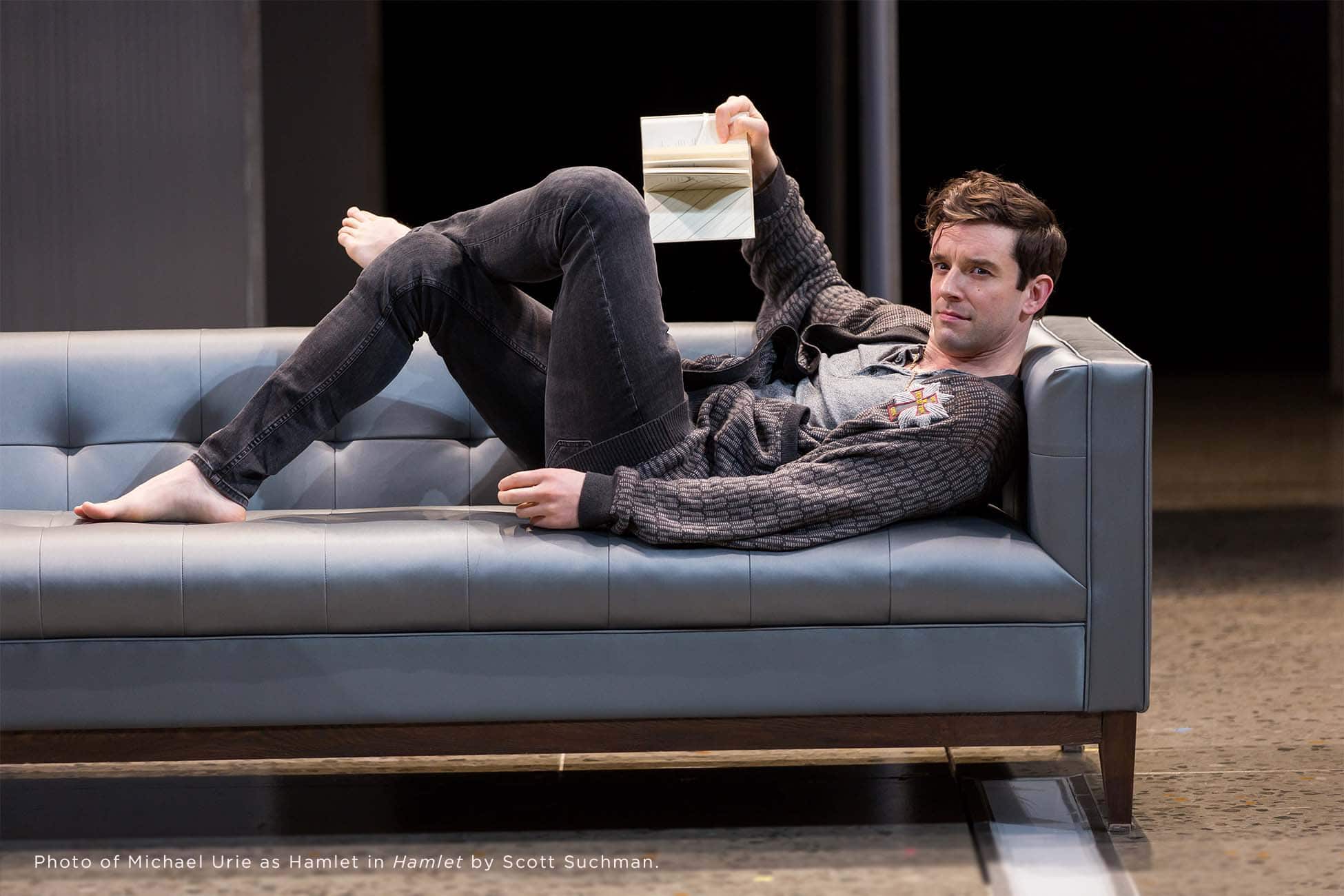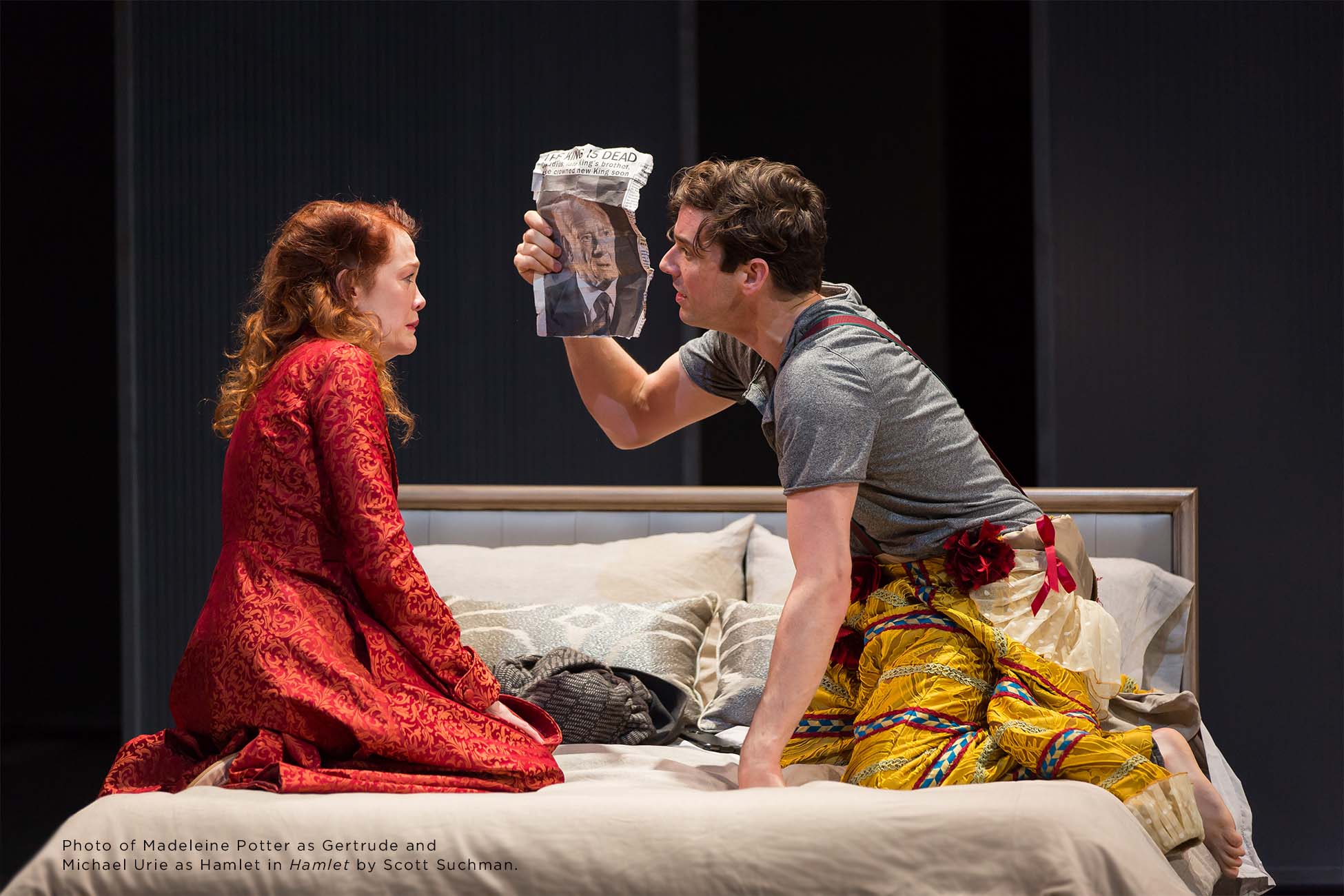Hamlet is the most produced play in the world. It is said that Hamlet is being performed somewhere every single minute of every single day. Now, the Shakespeare Theatre Company is presenting a superb Hamlet, starring Broadway’s Michael Urie as the heartbreakingly witty, doomed prince we all love. Even better, this Hamlet is presented through STC’s annual “Free for All” program in which all tickets are absolutely free.

First-rate Shakespeare for free, founded by Michael Kahn, is one of the most popular traditions of the Shakespeare Theatre Company. This event, now in its 29th year, makes Shakespeare accessible to all residents of the DMV. To date, over 700,000 people have attended. This year’s offering is a special one: director Craig Baldwin’s remounting of the celebrated 2018 production of Hamlet, directed by Kahn.
Michael Urie (Ugly Betty, Torch Song), given the opportunity to reprise the role, has deepened and enriched his already remarkable performance. His monologue “Oh, that this too too solid flesh would melt” opens the play, and by defining the dramatic stakes of the evening, adds to its poignancy. Urie masters Hamlet’s many paradoxes with ease, and he is paired with a beguiling new Ophelia in Ayana Workman.
Alan Cox again brings us Claudius, the smooth politician. As a politician would, he announces his brother’s death and his marriage to the queen with no indication that the wedding was somewhat hasty. He exhorts Hamlet to get over his grief, calling it unmanly. Hamlet is not entitled to be unhappy; that would mean that Claudius’s actions had consequences. Still, the King’s thwarted efforts at prayer are deeply moving.
Madeleine Potter as Gertrude is once again the beautiful wife, in love with her husband but very disturbed by Hamlet’s lingering pain. Her blazing fight with Hamlet, in which both are intermittently sobbing, in a way reminds us of the depth of love between mother and son. Robert Joy’s Polonius is deliciously comic, but it is impossible not to be moved by his devotion to his children, despite his somewhat stale admonitions. Joy has captured not only the “foolish, prating knave” but the deeper anxiety of a nervous father. Workman as Ophelia is delightful in these early scenes, chafing against the endless advice she receives from her father and brother, and still very much in love with Hamlet.
Hamlet is surrounded, as in the Kahn production, by a cruelly authoritarian and eerily familiar world. He wields a gun; jackbooted guards treat him roughly; at one point he is strapped into what could almost be an electric chair. Yet Urie’s Hamlet, no matter how angry or grief-stricken he is, rarely loses his humor or his essential good nature. His cruelty to Ophelia is explained by the fact that he has just discovered that she has betrayed him. For the most part, this is an affectionate Hamlet, who still loves everyone who has disappointed him.
Paul Deo, Jr.’s Laertes, is strikingly well done. He seems to instinctively understand the depth of the bond between brother and sister. Federico Rodriguez is fine as Horatio, one of the few people who never lets Hamlet down. Workman’s mad scenes, although somewhat muted, lose none of their power.
Keith Baxter’s voice is a haunting presence, whether he is playing the Ghost, the Player King, or the Gravedigger. His magisterial performance mesmerizes whenever he is onstage. Lise Bruneau is his fetching Player Queen, and Chris Genebach is Lucianus, who murders the Player King. It is rewarding to watch these actors as they declaim and pose, in a tribute to a style of acting which has long passed but which still seems to be one that actors enjoy. Gregory Wooddell portrays Osric as a kind of chilling functionary, which fits in beautifully with the atmosphere of fear.

Kelsey Rainwater as Guildenstern has a new Rosencrantz in Tim Nicolai. The two are obviously trying a bit too hard to convince Hamlet of their school days camaraderie. Hamlet, for his part, suspects them from the beginning. The play is full of spies; Reynaldo (Michael Haller) is set to spy on Paul Deo, Jr.’s Laertes. Polonius spies on Hamlet and his mother. Ophelia spies on Hamlet. Hamlet, by putting an antic disposition on, spies on everyone.
All the minor roles are played with the usual excellence we expect from STC. The three sentinels, Barnardo (Chris Genebach), Francisco (Omar D. Cruz), and Marcella (Krystel Lucas), are modern security guards, as in the Kahn production.
Women are showcased, in some cases. Kelsey Rainwater is Guildenstern. Krystel Lucas appears as the Prologue, Marcella, and Fortinbras. Ambassador Voltemand (David Bryan Jackson) has a female ambassador to accompany him, Cornelia (Lise Bruneau). The Ensemble members are Grace Brockway, Omar D. Cruz, Michael Haller, Megan Huynh, Joe Mucciolo, Keanu Ross-Cabrera, and Jeff Allen Young.
The stellar creative team from the previous production are returning: Scenic Designer John Coyne; Costume Designer Jess Goldstein; Lighting Designer Yi Zhao, Projection/Video Designer Patrick W. Lord, and the firm Broken Chord (Sound Design and Original Music). Special mention is due to returning Fight Choreographer David Leong.
The eternal mystery that is Hamlet is before us again. We are fortunate.
Running Time: Three hours, with one 15-minute intermission.
Hamlet, the Shakespeare Theatre Company’s 2019 Free For All production, plays through July 21, 2019, at Sidney Harman Hall, 610 F Street NW, Washington, DC. For information on how to access Free For All tickets, go online.




